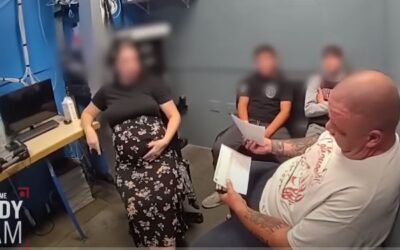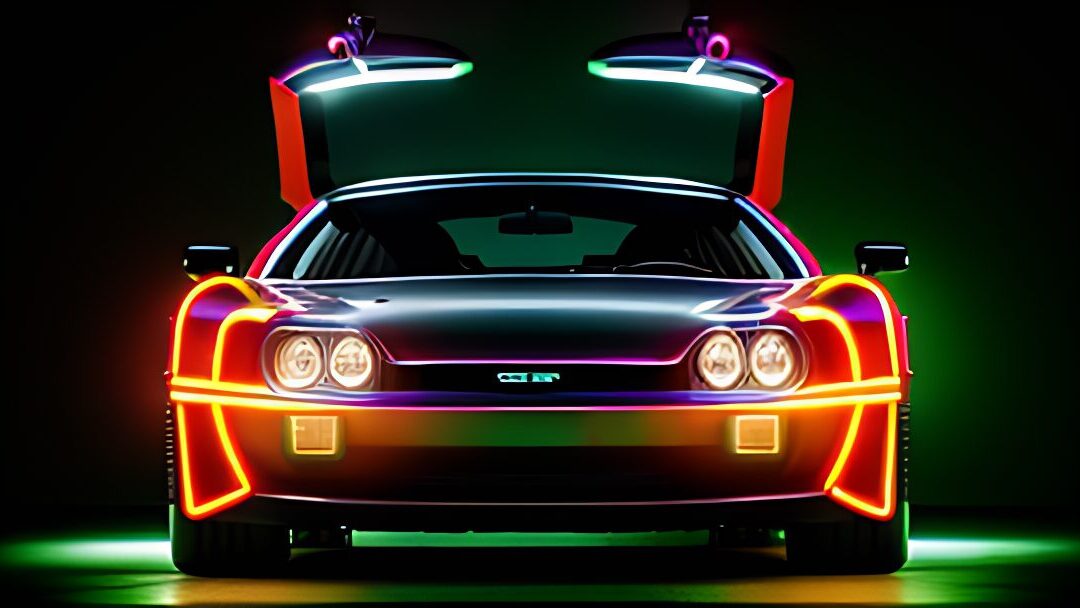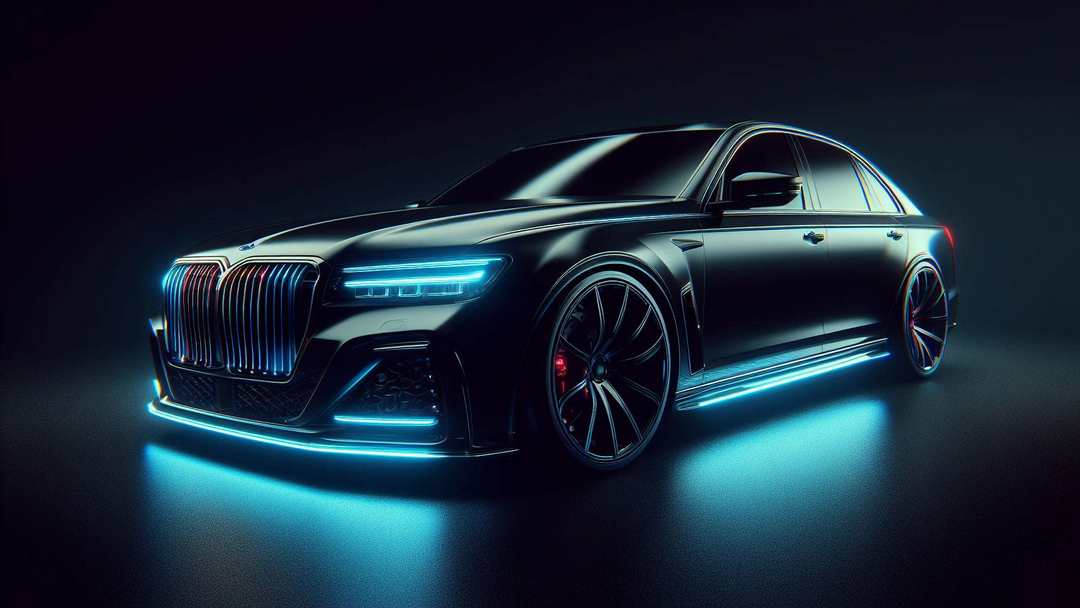Equipment & Lighting
Question: Can I install neon lighting within the interior of my vehicle?
Answer: The problem with placing neon lighting inside a vehicle is that the vehicle code is very specific about the color of lamps allowed on a vehicle and what color can be seen from what direction. For instance, the only color legally allowed to be displayed to the front of a vehicle is white or amber. The only color allowed to be displayed to the rear is red or amber. To the sides, front – amber or white, rear – amber or red. No other colors are allowed and if any permitted color lamp is visible from any direction that is not allowed then it cannot be equipped that way. If the lighting causes a visual impairment for the driver or is potentially distracting then such lighting is unlawful. Finally, like exterior neon lighting, there is no provision within the Michigan Vehicle Code that allows the use of interior neon lighting. Ultimately it will be a matter for the prosecutor and courts to decide.
Question: Are neon license plate frames legal?
Answer: You may equip your vehicle with a license plate frame that contains neon lights however they must be covered and unlit while on the roadway or within the public right-of way. In addition, the frame cannot obstruct any of the registration information on the plate or tabs.
Question: Can I have neon underbody lighting on my vehicle?
Answer: MCL 257.698(4) prohibits equipping a vehicle with any lighting that is not expressly required or permitted by Chapter 6, unless both covered and unlit. Neon underbody lighting is neither expressly required nor permitted. If equipped, the lights must be unlit and covered while on a highway, which includes all public roads and the adjacent rights-of-way.
Question: I am considering equipping my vehicle with neon valve stem lights. Are they legal?
Answer: If installed on a vehicle, the lights must be both covered and unlit while on a highway (any public road, including the right-of-way). This prohibition includes, but is not limited to: windshield wiper lights, tire valve stem lights, overhead/roll bar lights, underbody lights, and interior after-market lighting if visible from outside of the vehicle.
Question: Are smoked-out headlight covers legal?
Answer: The Michigan Vehicle Code requires head lamps to emit a white light, with “high-beams” of intensity to reveal persons and vehicles at a distance of at least 350 feet ahead, and low-beams of intensity to reveal persons and vehicles at a distance of at least 100 feet ahead. Since smoked headlamp covers change the color of light, and/or decrease their intensity below the requirements, they should not be used when headlamps are required to be on. However, smoked headlamp covers may be used when headlamps are not on, and not required.
Question: Is having smoked taillight/brake covers legal in Michigan? How about the smoked ones with slashes or vents in them showing a small part of the original red lens?
Answer: MCL 257.686 requires a tail lamp to emit a red light plainly visible for at least 500 feet to the rear of the vehicle. MCL 257.697 requires stop lamps to emit a red or amber light and be capable of being seen and distinguished from other lamps for a distance of 100 feet, including during normal daylight. If the cover you apply prohibits the lamp from meeting these requirements, then it is unlawful.
Question: I own a retired Police Cruiser and am looking into adding on some extra equipment (Spotlights, etc.). Before I do so I would like to know what is legal (both on and off the road) here in Michigan?
Answer: If your intention is to equip this vehicle to represent an authorized emergency vehicle you cannot operate that vehicle on the roadway unless you are a peace officer. The use and/or possession of a flashing, rotating, or oscillating light of any color would be prohibited.
Should you decide to operate a vehicle on the roadway equipped as a police vehicle you would be subject to arrest for the criminal act of “False Representation as a Peace Officer”.
Question: Would it be legal to install a (police type) siren on my car for purposes of an auto alarm?
Answer: MCL 257.706 covers sirens on vehicles. Under the circumstances you describe the installation and use of a siren would be illegal.
Question: What are the state laws on dash cameras?
Answer: MCL 257.709(1)(c) prohibits an object that obstructs the vision of the driver of the vehicle, except as authorized by law. Assuming the driver of a vehicle is otherwise able to safely operate the vehicle, the added equipment (“dash camera”) does not interfere with or obstruct the driver’s clear vision of the highway or an intersecting highway, and to the extent the equipment might prevent the clear view of the highway behind the vehicle, the vehicle is equipped with 2 rearview mirrors (1 on each side, adjusted so that the operator has a clear view of the highway behind the vehicle), I am unaware of a specific provision of the MVC that could be cited as a violation.
Question: I would just like to know if there is any sound level or DB law here in Michigan for automotive exhausts, specifically aftermarket?
Answer: MCL 257.707c provides the decibel levels at which the noise is considered excessive, while MCL 257.707e addresses the procedure for conducting a test. It is important to note that while these objective levels are provided, a vehicle below these levels may still be in violation. MCL 257.707b requires an exhaust system to be maintained in good working order to prevent excessive or unusual noise, which can be subjective. MCL 257.707 requires that an exhaust system be equipped with a muffler, and a resonator and tailpipe, if originally equipped. This precludes the modification of an exhaust system beyond the replacement of worn-out parts.
Question: I am wondering what vehicle equipment requirements must be followed for a four-wheeled motorcycle. Or what the law is on making a 4-wheeler, able to use on public roads.
Answer: MCL 257.31 defines a motorcycle as “every motor vehicle having a saddle or seat for the use of the rider and designed to travel on not more than 3 wheels in contact with the ground but excluding a tractor.” Therefore, a four-wheel vehicle is not a motorcycle under Michigan law regardless of the vehicle configuration. The type of vehicle that you are describing would probably fall in the category of “ORV,” defined in MCL 324.81101.
As noted on the SOS website, certain off-road vehicles (ORVs), all-terrain vehicles (ATVs) and off-road dune buggies can be titled as an assembled vehicle for on-road use.
If this type of ORV is not currently titled, registered and insured for on-road use, it may only be operated on a highway under very limited circumstances if it meets the definition of an ORV as provided in MCL 324.81101 of the Natural Resources and Environmental Protection Act. The limited circumstances, such as crossing a street or highway at a right angle for the purpose of getting from one area to another, can be found in MCL 324.81122.
Additionally, MCL 324.81131 authorizes local municipalities to pass an ordinance allowing the operation of ORV’s on streets within the municipality and sets forth the requirements and restrictions in doing so.
Question: Are tire chains legal in Michigan?
Answer: MCL 257.710 of the Michigan Vehicle Code covers the use of tire chains, and states that a person may “use a tire chain of reasonable proportion upon a vehicle when required for safety because of snow, ice, or other condition tending to cause a vehicle to skid.” If used, the chain must not come in contact with the surface of the roadway.
Question: Are studded tires legal in Michigan?
Answer: In practical terms, no.
MCL 257.710 allows for the use of studded tires if they meet the specifications listed in subparts (c), (d), and (e). The part that specifically deals with studded tires is subpart (d) which states; “The department of state highways and transportation shall promulgate rules establishing acceptable standards to permit the use of a tire with studs or other traction devices to be used on a street or highway after April 1, 1975. The rules shall make separate provision for the extreme winter snow and ice conditions of the Upper Peninsula and the Northern Lower Peninsula. The rules shall include a restriction on the amount and dimension of protrusions that may be allowed on a tire, the type of material that may be used in a stud, traction device, or tire, and the amount of road wear that a tire with studs or other traction devices may cause on a street or highway.”
Administrative Rules 247.171 through 247.175 govern studded tires and set the criteria for their use.
These rules state two conditions that must be met for the use of studded tires. Note: to date no manufacturer of tire studs has supplied information to the Michigan Department of Transportation that their product meets or exceeds the required pavement wear specifications.
First, they can only be used between November 15 and April 1 of the succeeding year except in the Upper Peninsula and the Northern Lower Peninsula, where, because of extreme winter snow and ice conditions, they may be used between October 1 and May 1 of the succeeding year. Northern Lower Peninsula is defined as those counties whose southern boundaries are as far or farther north than the southern boundary of Missaukee County.
Second, studs or other traction devices shall not be used unless they wear either concrete or asphalt pavements, typical of those in this state, at a rate not to exceed 25% of the reference standard studded tire.
Question: Are radar jammers illegal in Michigan?
Answer: RADAR jammers, both active and passive, are illegal under federal law in all 50 states (see excerpt from FCC news release).
FCC FINDS MARKETING OF ROCKY MOUNTAIN RADAR’S SPIRIT II RADAR JAMMER TO BE IN VIOLATION OF ITS RULES. Ruled that a radar jamming device manufactured by Rocky Mountain Radar that interferes with police radar signals is illegal; found that interference from these devices creates a threat to public safety. Report No: CI 97-14. by MO&O. Action by: Commission. Adopted: December 4, 1997. (FCC No. 97-404) News Media Contact: David Fiske 202-418-0500. CIB Contact: Ana J. Curtis at 202-418-1160.
Question: Is the use of a radar detector in a private vehicle legal in the State of Michigan?
Answer: Radar detectors are legal for use in passenger vehicles in the state of Michigan.







